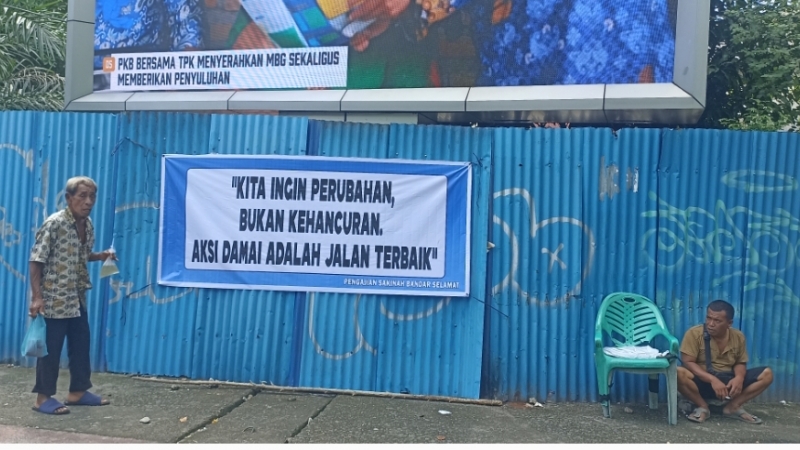A number of roads in Medan City appeared quiet and empty. No traffic density or congestion was visible.
Observations along sections of Diponegoro Street, Raden Saleh Street, Imam Bonjol Street, Perdana Street, and Zainul Arifin Street showed only one or two vehicles passing by.
The scarcity of vehicles traveling through these road sections is estimated to be an effect of circulating information mentioning a demonstration on September 1-2, 2025 in Medan City.
On Diponegoro Street, specifically in front of Benteng Field, two military trucks belonging to the Indonesian Army were seen standing guard. Meanwhile, in front of the North Sumatra Regional Legislative Council building, police officers and Public Order Agency personnel were seen on guard.
Meanwhile, banners containing calls for peaceful action were seen scattered along these road sections.
These banners appeared to be issued in the name of religious institutions. For example, a banner installed on Imam Bonjol Street contained a call for peaceful action, beneath which was listed the name Pengajian Sakinah Bandar Selamat.
Diponegoro Street
Diponegoro Street is a major thoroughfare in Jakarta, Indonesia, named after Prince Diponegoro, a national hero who led a famous rebellion against Dutch colonial rule in the Java War (1825-1830). Today, it is a prominent street in the Menteng area, known for its central location and historic significance.
Raden Saleh Street
Raden Saleh Street is a major thoroughfare in central Jakarta, Indonesia, named in honor of the 19th-century Javanese romantic painter and national hero, Raden Saleh. Historically, the area was part of the affluent Weltevreden district, developed by the Dutch colonial government in the 18th century. Today, it is a significant commercial and government hub, home to important buildings like the Indonesian Supreme Court.
Imam Bonjol Street
Imam Bonjol Street is a major thoroughfare in Jakarta, Indonesia, named after Tuanku Imam Bonjol, a national hero who led the Padri War (1803–1837) against Dutch colonial rule in West Sumatra. The street is historically significant as it was developed during the Dutch colonial era and is home to several important landmarks, including the iconic Hotel Indonesia roundabout. Today, it remains a vital commercial and administrative artery in the heart of the city.
Perdana Street
Perdana Street is a major thoroughfare in Kuala Lumpur, Malaysia, historically significant as one of the city’s oldest roads. It was originally constructed by the British colonial administration and runs past important landmarks like Merdeka Square and the Sultan Abdul Samad Building, areas central to Malaysia’s administration and independence.
Zainul Arifin Street
Zainul Arifin Street is a major thoroughfare in Jakarta, Indonesia, named after Zainul Arifin, a national hero and former vice prime minister. The street is historically significant for its colonial-era architecture and its central role in the city’s administrative and commercial life.
Benteng Field
Benteng Field is a historic sports venue located in Tangerang, Indonesia. It was originally constructed by the Dutch colonial government in the 1930s and served as a military sports field. Today, it is a multi-purpose public stadium used for football matches and other local events.
North Sumatra Regional Legislative Council
The North Sumatra Regional Legislative Council (Indonesian: Dewan Perwakilan Rakyat Daerah Provinsi Sumatera Utara) is the provincial-level legislative body for the Indonesian province of North Sumatra. It was established to represent the people of the region and is responsible for creating local regulations, budgeting, and government oversight. Its history is tied to the broader decentralization and democratization of Indonesia following the fall of the New Order regime in 1998.
Pengajian Sakinah Bandar Selamat
“Pengajian Sakinah Bandar Selamat” is a contemporary Islamic study group or religious gathering (pengajian) in Indonesia, focused on creating a peaceful and devout community (“Sakinah” means tranquility). While its specific founding history is not widely documented, such groups are a common and important modern feature of Indonesian Islamic life, providing regular religious education and fostering community bonds among local Muslims.






